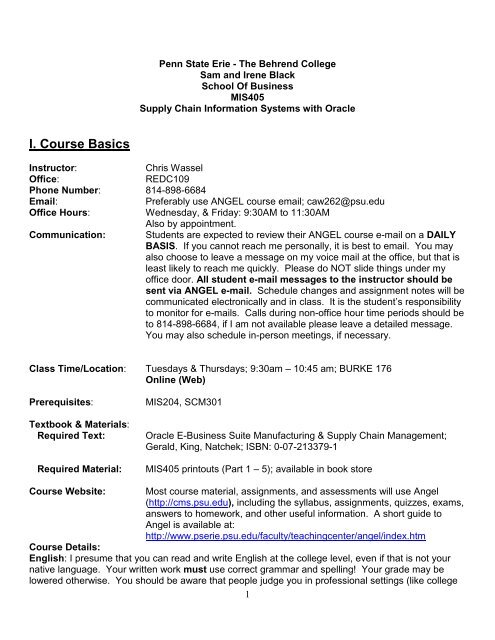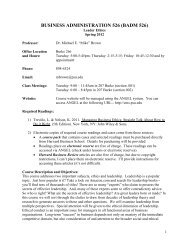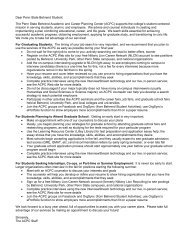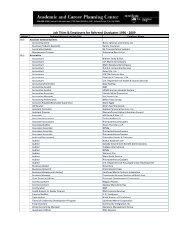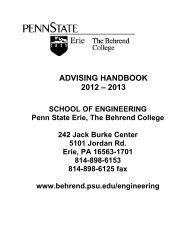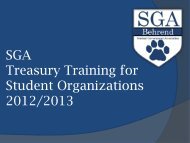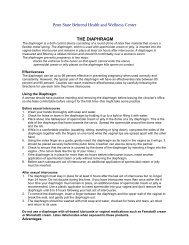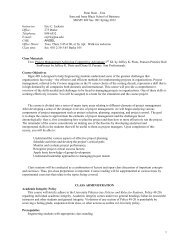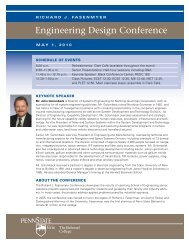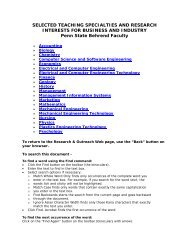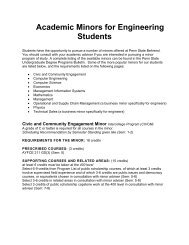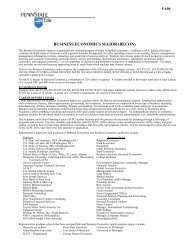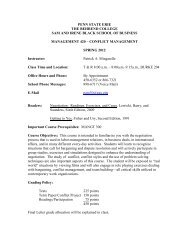I. Course Basics - Penn State Erie, The Behrend College
I. Course Basics - Penn State Erie, The Behrend College
I. Course Basics - Penn State Erie, The Behrend College
You also want an ePaper? Increase the reach of your titles
YUMPU automatically turns print PDFs into web optimized ePapers that Google loves.
I. <strong>Course</strong> <strong>Basics</strong><br />
<strong>Penn</strong> <strong>State</strong> <strong>Erie</strong> - <strong>The</strong> <strong>Behrend</strong> <strong>College</strong><br />
Sam and Irene Black<br />
School Of Business<br />
MIS405<br />
Supply Chain Information Systems with Oracle<br />
Instructor: Chris Wassel<br />
Office: REDC109<br />
Phone Number: 814-898-6684<br />
Email: Preferably use ANGEL course email; caw262@psu.edu<br />
Office Hours: Wednesday, & Friday: 9:30AM to 11:30AM<br />
Also by appointment.<br />
Communication: Students are expected to review their ANGEL course e-mail on a DAILY<br />
BASIS. If you cannot reach me personally, it is best to email. You may<br />
also choose to leave a message on my voice mail at the office, but that is<br />
least likely to reach me quickly. Please do NOT slide things under my<br />
office door. All student e-mail messages to the instructor should be<br />
sent via ANGEL e-mail. Schedule changes and assignment notes will be<br />
communicated electronically and in class. It is the student’s responsibility<br />
to monitor for e-mails. Calls during non-office hour time periods should be<br />
to 814-898-6684, if I am not available please leave a detailed message.<br />
You may also schedule in-person meetings, if necessary.<br />
Class Time/Location: Tuesdays & Thursdays; 9:30am – 10:45 am; BURKE 176<br />
Online (Web)<br />
Prerequisites: MIS204, SCM301<br />
Textbook & Materials:<br />
Required Text: Oracle E-Business Suite Manufacturing & Supply Chain Management;<br />
Gerald, King, Natchek; ISBN: 0-07-213379-1<br />
Required Material: MIS405 printouts (Part 1 – 5); available in book store<br />
<strong>Course</strong> Website: Most course material, assignments, and assessments will use Angel<br />
(http://cms.psu.edu), including the syllabus, assignments, quizzes, exams,<br />
answers to homework, and other useful information. A short guide to<br />
Angel is available at:<br />
http://www.pserie.psu.edu/faculty/teachingcenter/angel/index.htm<br />
<strong>Course</strong> Details:<br />
English: I presume that you can read and write English at the college level, even if that is not your<br />
native language. Your written work must use correct grammar and spelling! Your grade may be<br />
lowered otherwise. You should be aware that people judge you in professional settings (like college<br />
1
and a job) by the quality of your written and spoken word. You should get into the habit of using<br />
correct grammar now, if you have not already. You must use correct grammar and spelling in emails<br />
you send me, too. Do not be offended if I reply to your email with a few comments about this,<br />
to try to help you change bad habits if necessary.<br />
Classroom Policy: It is very important for you to come to class. I will try to maintain a classroom<br />
environment that is welcoming and conducive to learning. In return, I expect you to come to class with<br />
a motivated, cooperative attitude and maintain certain behavior standards. I expect that you will be<br />
polite and not distracting during class. Please do not talk with other students, read material other than<br />
course materials, etc. Along with being rude, these types of behaviors are distracting for other<br />
students, as well as me, and interfere with lectures. Be sure to turn off your cell phone before class<br />
starts! Please be advised, I may confiscate (or answer) a ringing cell phone. If you have an<br />
emergency, and need to have your cell phone on, please discuss this with me in person first, and<br />
please keep your phone on vibrate mode.<br />
Angel Calendar & Announcements: I will use the calendar in Angel, as well as the ANGEL<br />
announcements section, to list course lectures, assignment due dates, exam dates, and other important<br />
information. You should consult the calendar and announcements frequently to remain on track in the<br />
course. While the Angel calendar should be kept current, it is your responsibility to know when<br />
assignments are due and when exams will be held. Also, all dates in the course are subject to<br />
change. However, you will be given ample time/notice for any changes.<br />
<strong>Course</strong> Suggestions, Etc.: In striving to create an environment that is fair, welcoming, comfortable,<br />
and conducive to learning for all students, I respect, and welcome, any suggestions that you may have<br />
for improving the course (supplemental course material, teaching methods, etc.). I welcome you to<br />
discuss these with me in person, before or after class. For those of you that may not be comfortable<br />
with discussing suggestions face-to-face, you will find a <strong>Course</strong> Suggestions Forum on the course<br />
Angel site. <strong>The</strong> forum is structured anonymously, so that I only am able to view the comment and not<br />
the author. I will review the forum frequently and will do my best to incorporate as many suggestions as<br />
possible. Please remember, though, that there are topics that I must cover, and assessments that I<br />
must give to evaluate your performance. <strong>The</strong>refore, in completing the course objectives (listed below), I<br />
may not be able to implement all suggestions.<br />
Along with suggestions for the course improvement, I expect that you will not take everything I say to<br />
you in blind faith. Obviously, I strive to be completely accurate with all course material. However, as all<br />
people do, I will make mistakes. I welcome and expect you to challenge me on material that you find<br />
inaccurate. This shows that you are actively participating in the learning process. My only request is<br />
that all challenges are handled in a professional manner (the same goes for the suggestions forum<br />
mentioned above).<br />
II. <strong>Course</strong> Objectives & Policies:<br />
<strong>Course</strong> Description: This course involves extensive discussion and study in the understanding of<br />
supply chain information systems and processes. <strong>The</strong> vast majority of business data is generated<br />
through the use of supply chain information systems to execute business processes. Successful<br />
program managers and business analysts must understand how data is generated (the business<br />
processes that generate data), and how this strategic data is used to integrate various business<br />
2
functions. This course will focus on the management of supply chain information systems, and will<br />
include topics in the following areas:<br />
• Inventory Management<br />
• Purchasing<br />
• Bills of Material and Engineering<br />
• Master Scheduling and Material Requirements Planning<br />
• Oracle E-Business Suite Database Structure Overview<br />
<strong>Course</strong> Learning Objectives:<br />
• Explain and discuss the importance and interrelationships of key data generated from business<br />
process transactions<br />
• Identify & understand key inventory management workflow processes<br />
• Identify & understand strategic purchasing workflow processes<br />
• Identify & understand key bills of material workflow processes<br />
• Identify & understand strategic master scheduling and material requirements planning<br />
workflow processes<br />
• Demonstrate operational skills needed to navigate and use enterprise resource planning (ERP)<br />
business software<br />
• Explain and discuss Oracle database structure<br />
• Explain and discuss security issues and system setup activities<br />
<strong>Course</strong> Components: This course will consist of course lectures, Oracle lab activities, class<br />
discussion, review quizzes, homework assignments, online assignments, a final project,<br />
professionalism / participation, and three exams.<br />
EXAMS: <strong>The</strong>re will be three exams. Exams will be closed note / book and will be administered<br />
through ANGEL. Exams are INDIVIDUAL ASSIGNMENTS and there should be no collaboration<br />
between students.<br />
Homework Assignments: Homework will be assigned to supplement course lecture and reinforce<br />
course topics. Homework will be assigned by the instructor, as necessary, throughout the semester.<br />
Online Assignments: This course is being offered via hybrid delivery. <strong>The</strong>refore, the course will<br />
incorporate both in-person and online activities and assignments. Online assignments will be<br />
administered via ANGEL and will be found in each respective Lesson folder on the ANGEL site.<br />
Oracle Lab Assignments: This course will include a special focus on Oracle eBusiness suite<br />
applications. Approximately 9 Oracle lab exercises have been designed to ensure participants<br />
understand implementation strategies, supply chain information system processes, and data analysis.<br />
Lab assignments will generally be cumulative and must be completed in sequence. All Oracle<br />
assignments will be posted on the Angel class web site. Oracle lab assignment solutions are expected<br />
to be submitted electronically through the Angel class web site. Each Oracle assignment will be<br />
contained within a unique ANGEL folder. Each Oracle assignment folder will contain the assignment<br />
instructions along with flash video examples of how to run each transaction. Prior to beginning the<br />
Oracle assignment, you should read through the assignment in its entirety and view each of the<br />
3
transaction flash video tutorials. It is much easier to take the time up front and understand the<br />
required steps, than fixing problems after they have occurred. On the other hand, if you run into<br />
problems with the Oracle assignments and need to “fix” the Oracle results, you will certainly learn more<br />
about Oracle. If you run into problems, you should have patience, and expect to spend time<br />
resolving the problem.<br />
Final Project: A final Oracle project (Case study) will be assigned. <strong>The</strong> final project will incorporate<br />
course concepts and lab activities completed throughout the semester.<br />
Attendance Policy: It is extremely important that you show up for class, pay attention to lectures, ask<br />
questions when you are uncertain about something, and take notes. It is expected that you will<br />
attend every class, except in cases of emergency. You are responsible for all material presented<br />
and assignments given during class, including those in classes which you miss. If you must miss a<br />
class, be sure to find out what announcements and assignments were made, and what material was<br />
covered, before returning to class. While you will not lose points for missing a class, I strongly<br />
recommend you attend all classes, except in case of emergency.<br />
Professionalism: <strong>The</strong> professionalism component will be awarded base on class attendance,<br />
participation in course discussions / activities / assignments, and professional behavior in class, onkine,<br />
and in all writing assignments. A note on this component, I will not keep track each and every time a<br />
student participates in class. However, I will take note of those that do participate and those that do<br />
not. As long as you attend class, participate in class activities, and act in a professional manner, you<br />
will receive full credit for this component. This component will be awarded on a daily basis. <strong>The</strong>refore,<br />
if you do not attend class, you will receive 0 points for that day. For online activities, credit will be<br />
awarded based on completion of online activites per instructions found on ANGEL.<br />
Reading / Research Assignments & Lectures: I will often assign reading / research assignments<br />
from the course text and online resources. <strong>The</strong> purposes of the reading / research assignments are to<br />
prepare you for, and enhance, the course lecture, to integrate in-class and online activites, and / or to<br />
provide a summary of previous activities. In order to get the most out of this class, I expect you to<br />
complete all assigned reading / research by the assigned due date. Exam material may come from any<br />
/ all course assignments and lectures. Completing reading assignments before coming to class will<br />
allow you to prepare for asking and answering questions during the lectures.<br />
<strong>Course</strong> lectures will be structured around reading / research assignments, homework / in-class<br />
activities, lab activities, and the course handouts (Part 1-5). I strongly recommend that you take notes<br />
during the lectures. In addition to including supplemental material in course lectures, I will discuss<br />
important points during the lectures.<br />
<strong>Course</strong> Grading: Student success in meeting the learning objectives will be assessed through a<br />
combination of three exams, Oracle lab assignments, homework, a final paper, and class discussion /<br />
participation. <strong>The</strong> points assigned to each of the course components are as follows: (Components /<br />
points may be added or eliminated.)<br />
4
Exams: 150 (three exams at 50 points each)<br />
Oracle Assignments: 90 (9 labs at 10 points each)<br />
Review Quizzes: 100 (5 quizzes at 20 points each)<br />
Final Oracle Project: 100<br />
Homework 100-150 (Approximation, may increase or decrease)<br />
Professionalism 150 (30 class periods, 5 pts. Per class)<br />
Grading Scale:<br />
A 93-100% B+ 87-89% C+ 77-79% F 60% or below<br />
A- 90-92% B 83-86% C 70-76%<br />
B- 80-82% D 61-69%<br />
Late assignment policy: Assignments submitted up to 1 day (24 hours) after the due date and time<br />
will receive a 10% point deduction. Assignments submitted 1-2 days (24+hours – 48 hours) after the<br />
assigned due date & time will receive a 20% point deduction. Assignments submitted 2-7 days (48+<br />
hours – 1 week) after the due date & time will receive a 50% deduction. Any assignments turned in<br />
after 1 week of the due date and time will NOT receive credit. All deductions are taken prior to<br />
grading submitted assignments. For example, if you turn an assignment in 3 days late, the<br />
maximum score you can receive for the assignment is a 50% (assuming you miss no points<br />
on the assignment). If you submit an assignment late, or once the semester has concluded, please<br />
do not come to me and ask me to amend the late policy for you. In striving to be fair to all<br />
students, I cannot provide any student special treatment over the others. Please note, this policy<br />
will be strictly enforced.<br />
Bonus Points: <strong>The</strong> opportunity for bonus points may arise during the semester. If the opportunity<br />
presents itself, the instructor will announce the bonus point opportunity during class time. Just as<br />
with any missed class, if a student is absent during classes when bonus point opportunities are<br />
announced, it is the student’s responsibility to identify what assignments / opportunities were given<br />
during the missed class. All bonus points earned during the semester will be tracked by the professor<br />
and added onto the students’ final grades at the culmination of the semester. Bonus points are<br />
opportunities to earn points above and beyond those assigned for the class that will be assigned by<br />
the instructor as his discretion. As with the late assignment policy, please do not come to me and<br />
ask for more bonus points or extra credit at the end of the semester.<br />
III. Tentative <strong>Course</strong> Calendar:<br />
Date Topic<br />
Week 1 – Aug 23 & 25 <strong>Course</strong> Intro<br />
Intro to ERP & SCIS<br />
Week 2 – Aug 30 & Sept 1 Shared Entities & Integration<br />
Multi-Org & Enterprise Structure<br />
Week 3 – Sept 6 & 8 Workflow<br />
5
Intro to Inventory Management<br />
Week 4 – Sept 13 & 15 Inventory Accuracy<br />
Inventory Accuracy<br />
Week 5 – Sept 20 & 22 Inventory Replenishment<br />
Inventory Replenishment & Exam 1 Review<br />
Week 6 – Sept 27 & 29 EXAM 1<br />
BOM & Routings<br />
Week 7 – Oct 4 & 6 Engineering & ECO’s<br />
Panning Overview<br />
Week 8 – Oct 11 & 13 Planning Overview<br />
Master Scheduling<br />
Week 9 – Oct 18 & 20 MRP<br />
MRP & Exam 2 Review<br />
Week 10 – Oct 25 & 27 EXAM 2<br />
Intro to Purchasing<br />
Week 11 – Nov 1 & 3 Intro to Purchasing / Requisitions<br />
Requisitions<br />
Week 12 – Nov 8 & 10 Purchase Orders<br />
Purchase Orders<br />
Week 13 – Nov 15 & 17 Receipts<br />
Receipts<br />
Nov. 20 – 26 THANKSGIVING BREAK NO CLASSES<br />
NO CLASSES<br />
Week 14 – Nov 29 & Dec 1 Oracle DB Structure<br />
Oracle DB Structure<br />
Week 15 – Dec 6 & 8 Oracle DB Structure<br />
Oracle DB Structure<br />
Final Exam - TBD EXAM 3 - TBD<br />
All dates and topics subject to change<br />
IV. ACADEMIC INTEGRITY:<br />
In order to be fair to the majority of students who are honest, I take a hard line on academic dishonesty.<br />
I believe that academic dishonesty undermines the whole process of higher education, and could make<br />
a <strong>Penn</strong> <strong>State</strong> degree meaningless if not prevented. <strong>The</strong>refore, I strongly endorse the University’s policy<br />
on academic dishonesty. Be aware that ACADEMIC DISHONESTY MAY RESULT IN AN<br />
AUTOMATIC COURSE FLUNK. When appropriate, other sanctions (such as suspension or expulsion<br />
from the University) may be pursued. Academic dishonesty includes, among other things, copying<br />
exam answers, attempting to get an advance copy of the exam, changing answers on a quiz,<br />
assignment, or exam after it has been submitted and/or returned, storing information in a calculator, cell<br />
phone or other device for use during exams, and using someone else's work when answering questions<br />
/ assignments. Working together on an assignment outside class CAN be academic dishonesty, too, if<br />
you should be doing the work on your own. Academic dishonesty also includes allowing someone else<br />
6
to use your work. Be advised that I will actively enforce this policy, out of fairness to the great majority<br />
of students who are honest and have to work hard for their grades. See University Senate Policies and<br />
Rules for Students, Policy 49-20. You should also be aware that <strong>Penn</strong> <strong>State</strong> has a policy of assigning<br />
an “academic dishonesty F” or “XF” grade which tells everyone viewing the transcript that the F grade<br />
was due to cheating. <strong>The</strong> PSU policy also requires faculty to notify the administration of virtually every<br />
cheating infraction, so that multiple occurrences by one student in different classes can be identified.<br />
More severe penalties are typically imposed when a student has had previous incidents. More<br />
information can be found at: http://www.pserie.psu.edu/faculty/academics/integrity.htm<br />
V. ADDITIONAL INFORMATION:<br />
STUDENT / INSTRUCTOR COMMUNICATION:<br />
Students are expected to review their ANGEL course e-mail on a DAILY BASIS. Note that you have<br />
the ability to set up your ANGEL email to automatically forward to another e-mail address. All<br />
student e-mail messages to the instructor should be sent via ANGEL e-mail. <strong>The</strong> purpose of<br />
this is for me to easily keep my work e-mails and class e-mails organized and separated. If I am<br />
traveling and do not have Internet access, I will communicate this to you in advance. Schedule<br />
changes and assignment notes will be communicated electronically and in class. It is the student’s<br />
responsibility to monitor for e-mails. Calls during non-office hour time periods should be to 898-6684,<br />
if I am not available please leave a detailed message. You may also schedule in-person meetings, if<br />
necessary.<br />
Academic and Career Planning Center<br />
<strong>The</strong> Academic and Career Planning Center (ACPC) can assist students with the process of career<br />
and life planning through a full range of programs and services. You may schedule appointments<br />
with the ACPC staff to discuss issues including interests, skills, values, and goal setting, as well as<br />
how to find career information, internships, full-time jobs, and graduate schools. You are<br />
encouraged to utilize the services of the ACPC every year from your first semester to graduation.<br />
ACPC Location: Second floor – Reed Building<br />
ACPC Phone: 898-6164<br />
ACPC Web Site: http://psbehrend.psu.edu/Academics/academic-services/acpc<br />
Writing tutoring is available in the Learning Resource Center, 203 Lilley Library.<br />
Math tutoring is available in the Roche Annex (2nd floor Roche Hall).<br />
Engineering tutoring is available in the REDC, room 240.<br />
Tutoring for other subjects and study skills is offered by appointment. Stop in at the Learning<br />
Resource Center.<br />
For more information go to: http://pennstatebehrend.psu.edu/academic/lrc/tutor.htm<br />
Note to students with disabilities: <strong>Penn</strong> <strong>State</strong> is strongly committed to providing full access to its<br />
programs and services for all individuals. <strong>The</strong> University encourages academically qualified<br />
7
students with disabilities to take advantage of the educational programs offered at <strong>Penn</strong> <strong>State</strong><br />
<strong>Behrend</strong>. <strong>The</strong> Office of Educational Equity and Diversity Programs, located in the Student Affairs<br />
Suite, on the second floor of the Reed Union Building, provides assistance and support for<br />
students. A disability services coordinator provides services tailored to meet the specific needs of<br />
each student.<br />
For more information go to:<br />
http://pennstatebehrend.psu.edu/student/Educational%20Equities/DISABILITY.htm<br />
8


